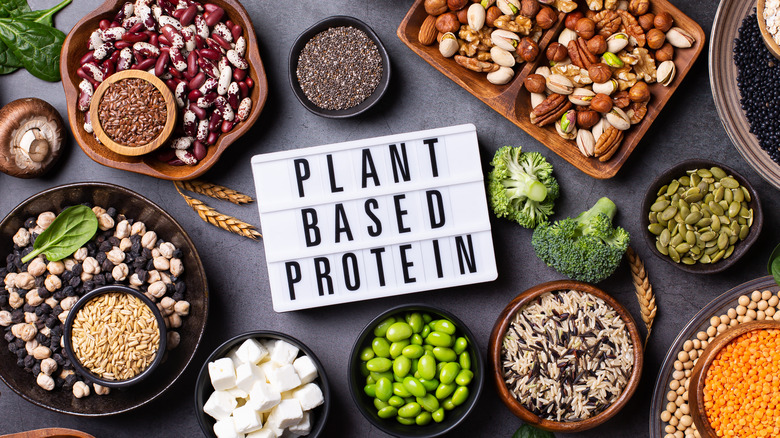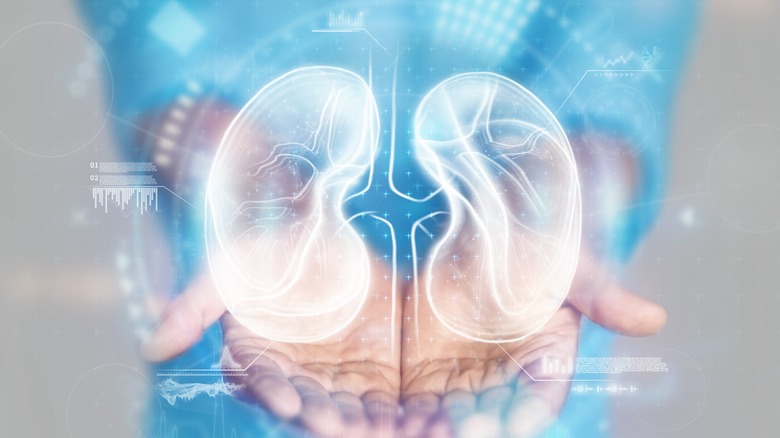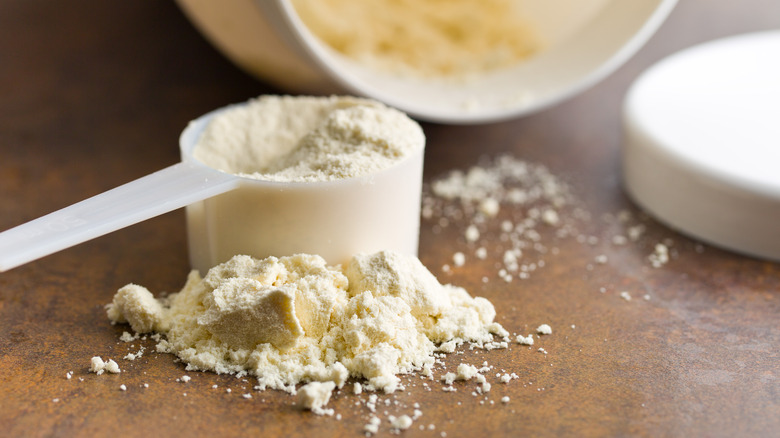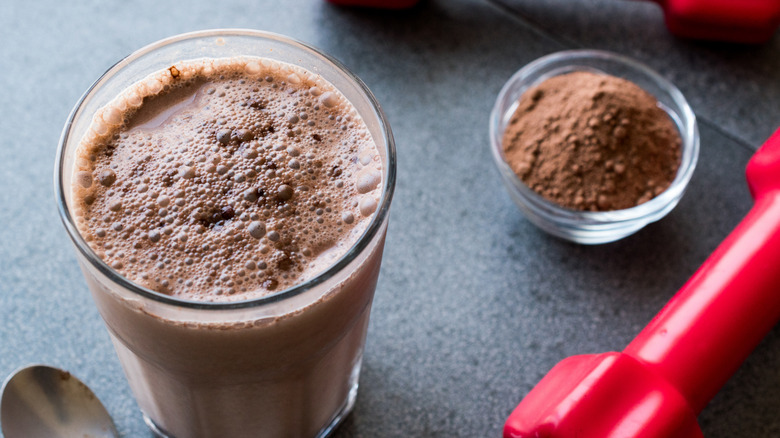11 Protein Myths You Should Stop Believing
Alongside carbs and fats, protein is one of the three primary nutrients (aka macronutrients). It is a vital macronutrient composed of amino acids, commonly referred to as the "building blocks" of life (via Medline Plus). According to a study published in the Journal of Sports Science and Medicine, there are 20 amino acids in total, all of which play a pivotal role in the construction and repair of tissues, facilitating the growth and maintenance of muscles, organs, and various bodily structures. Beyond its structural role, this dynamic macronutrient is not merely confined to muscle development and gym enthusiasts. Protein serves as a multifaceted player in sustaining overall health and well-being by being involved in an array of physiological processes. For instance, enzymes, hormones, and immune system components are all crafted from amino acids derived from dietary protein (per Medline Plus).
Despite protein's widely studied roles within the human body, there are still numerous myths surrounding protein consumption. As misconceptions continue to circulate, some people may find themselves adhering to rigid beliefs that may keep them from achieving their nutritional goals. In this article, we unveil the truths that will help you separate fact from fiction and guide you toward a more balanced and evidence-based approach to nutrition to help you make informed decisions about your diet. It's time to demystify the protein myths that may be holding you back from reaching your health and fitness goals.
Protein makes you gain weight
Despite common misconceptions, the notion that consuming protein (and protein powders) leads to weight gain is a persistent myth that warrants debunking. In fact, research highlights the potential benefits of protein intake in facilitating weight loss.
According to a study published in the Journal of Obesity and Metabolic Syndrome, consuming more than the recommended dietary allowance of protein, set at around 0.8 grams per kilogram of body weight per day (approximately 48–56 grams per day), has shown positive effects on body composition by not only reducing overall body weight but also by decreasing fat mass while preserving fat-free mass (such as muscles, bones, and organs), thus challenging the misconception that protein is a culprit in weight gain.
Moreover, besides being associated with weight-loss effects, a high-protein diet has been linked to the prevention of weight regain after shedding those extra pounds. This is attributed to the nutrient's ability to preserve lean muscle mass and boost energy expenditure, essential factors in maintaining a healthy weight. Per Healthline, the way protein increases energy expenditure is because the body spends more energy digesting protein compared to fat or carbs. This means that, in the process of breaking down and utilizing protein, your body burns more calories. Lastly, the impact of protein on appetite regulation further debunks the myth, as a high-protein diet has been shown to increase levels of appetite-suppressing hormones while decreasing the levels of appetite-stimulating ones, creating a hormonal balance that leads to heightened satiety signaling, increased feelings of fullness, and ultimately reduced overall food intake.
You must consume protein immediately after a workout
For years, the fitness world has promoted the idea of the "anabolic window," emphasizing the need for immediate protein consumption after a workout to maximize muscle development. However, emerging research suggests that as long as you meet your daily protein requirements, the timing of your protein intake may matter less than once believed (via U.S. News). When you work out, your muscles get microscopic damage, and dietary proteins provide the amino acids your body needs to fix the damage and create bigger and stronger muscles. Traditionally, the "anabolic window" theory declares that there is a specific and narrow post-workout timeframe during which muscles are more receptive to protein absorption to fix the damage (thus the idea that you must consume protein immediately after a workout).
Yet, while your muscles may indeed be more sensitive to protein immediately after a workout, prioritizing protein intake within 30 to 60 minutes after working out may not be as crucial as previously believed. Per Healthline, experts suggest that meeting your daily protein needs through balanced meals will grant you the same muscle-building results, rendering the post-workout protein intake craze unnecessary. As you can see, the emphasis has shifted from a time-specific approach to a more comprehensive perspective that takes into account your overall protein consumption. Plus, while protein shakes may offer convenience, especially for those with limited access to high-protein foods, they are not a mandatory requirement for achieving your fitness goals, and you can perfectly rely on animal- and plant-based foods to reach your protein targets.
Animal-based proteins are superior to plant-based proteins
The debate over whether animal-based proteins surpass their plant-based counterparts is a myth that warrants examination. Per a study published in the Journal of Sports Science and Medicine, the human body relies on approximately 20 different amino acids to assemble proteins. While some amino acids can be produced by the body, nine are deemed essential, meaning that they must be obtained through the diet. Therefore, the quality of a protein is often evaluated based on its essential amino acid composition. Animal-based proteins are known for being complete proteins containing all essential amino acids, thus granting them a perceived superiority. However, the study explains that this completeness comes with a trade-off, as these sources (with the exception of fish and lean meats) are frequently linked to higher saturated fat and cholesterol intake.
In contrast, while proteins from plant sources are deemed incomplete, lacking one or two essential amino acids, combining a variety of plant-based foods, such as nuts, grains, and legumes, ensures the intake of all essential amino acids with a reduced saturated fat and cholesterol intake (via Healthline). Additionally, certain plant foods like Ezekiel bread, quinoa, buckwheat, spirulina, soybeans, nutritional yeast, chia seeds, and hemp seeds offer complete protein profiles, dispelling the myth of plant-based proteins being inferior to their animal-based counterparts. Moreover, per the site, research suggests that those who follow a vegetarian diet often exhibit lower body weight, reduced cholesterol levels, and a decreased risk of stroke, cancer, and heart disease-related deaths compared to meat-eaters.
High-protein diets can increase the risk of heart disease
Heart disease stands as the leading cause of morbidity and mortality in the U.S., via the Centers for Disease Control and Prevention (CDC). Amidst concerns, a prevailing myth suggests that high protein intakes may increase the risk of heart conditions. However, recent research challenges this notion. According to a 2023 review in Nutrients, some people speculate that a high protein intake may lead to the formation of plaque or fatty deposits within artery walls. These deposits, called atherosclerotic plaques, can narrow the arteries and restrict blood flow, potentially leading to heart problems. However, the review, which thoroughly analyzed six studies involving 221,583 participants, found no meaningful association between high protein intake and an increased risk of heart-related conditions.
Contrary to the myth, the majority of studies actually showcase a positive impact of high-protein diets on reducing heart disease risk. This holds true for both apparently healthy people and individuals at an increased risk of heart disease or already dealing with it. In addition to the quantity of protein consumed, researchers explored the source of protein as a crucial factor, with evidence saying that vegetable proteins may improve markers of heart health. Similarly, a 34-month study involving 38 participants found that following a high-protein diet did not adversely affect heart health and blood vessel function in overweight individuals who had undergone a weight-loss intervention. This counters the belief that high-protein diets inherently pose a risk to heart health.
Vegans and vegetarians have to consume complementary protein sources at the same meal
The belief that vegans and vegetarians must meticulously combine complementary protein sources at the same meal for optimal nutrition has been debunked as a myth. First things first, consuming complementary protein sources refers to the act of combining two incomplete protein foods to create a meal that has all the necessary amino acids your body needs (per Bastyr University). However, contrary to the myth, a combination of incomplete proteins from various sources can collectively provide all the essential amino acids your body needs regardless of whether you ate them at the same meal or throughout the day, as stated by registered dietitian Gillian Culbertson, RD, via the Cleveland Clinic.
Per a study published in Nutrients, even though certain amino acids (such as lysine) may be limited in individual plant-based foods (such as grains), the body's ability to store and utilize them efficiently counters the belief that complementary proteins must be consumed simultaneously. For example, the study explains that after a protein-rich meal, approximately 60% of the daily lysine requirement for adults can be stored in your muscles within a short three-hour window. This means that even if a lysine-poor meal follows a lysine-rich one within this timeframe, there would still be sufficient stored lysine available to fulfill your protein needs. According to WebMD, vegetarian-friendly lysine-rich foods include cheese, eggs, tofu, beans, peas, lentils, and peanuts.
High-protein diets can damage your kidneys
The misconception that high-protein diets can harm kidney function has been a topic of debate, but recent insights reveal a different reality. According to a review published in the Annual Review of Nutrition, chronic kidney disease (CKD) affects around 13% of the population, is often linked to conditions like diabetes and high blood pressure, and is believed to be worsened by high-protein diets. However, it's crucial to consider the type of protein consumed and individual predispositions to kidney disease before drawing any conclusions. While long-term consumption of red meat has been associated with an increased risk of CKD, proteins from white meat and dairy show no such effect, and plant-based proteins may even have a protective effect.
Additionally, worries about high protein intake stem from the notion that it may damage the kidney's filtration system, potentially hastening kidney disease progression. However, some studies challenge this perspective. Per another review published in Advances in Nutrition, studies suggest that the observed increase in kidney filtration rate could be a normal adaptive response that shouldn't be a cause for alarm. Furthermore, a year-long study involving 14 healthy men contradicts the notion that protein intake at levels 3-4 times greater than the recommended daily allowance (RDA) causes harm. The findings indicate that, at least in healthy individuals, such protein levels did not have detrimental effects on kidney function. In conclusion, the myth that high-protein diets inherently damage kidneys needs reconsideration.
Too much protein is bad for your bone health
Osteoporosis is a condition that renders bones brittle and weak, and among its multiple causes, it occurs when the creation of new bone doesn't keep up with the loss of old bone (via the Mayo Clinic). According to a study published in Nutrients, the belief that excessively high protein intake might cause osteoporosis comes from a theory stating that consuming too much protein, especially from animal sources with more sulfur amino acids, could increase acid production, leading to a negative calcium balance (which is needed for bone strength) and potentially causing bone loss.
However, per the study, research actually challenges this hypothesis, indicating that higher protein intake that exceeds the general dietary recommendations is associated with higher bone mineral density (a key determinant of bone strength), a reduced risk of hip fracture, and a slower rate of bone loss. In addition, per the International Osteoporosis Foundation (IOF), protein plays a crucial role in building bone mass during childhood and adolescence, and this relationship persists into older age. Contrary to the myth, the IOF also states that a balanced diet with sufficient protein intake, regardless of its source (animal or vegetable), benefits bone health when accompanied by adequate calcium intake. Therefore, the myth that high-protein diets are detrimental to bone health is dispelled by current research.
Animal-based protein powders are better than plant-based ones for muscle gain
Many believe that animal-based protein powders outperform their plant-based counterparts in promoting muscle gain. Yet, this myth has been debunked by emerging research.
According to a review published in Nutrients, animal sources often top the list when evaluating protein quality due to their high levels of essential amino acids and better digestibility and absorption. However, recent findings show that a dose of plant protein that offers enough essential amino acids (especially leucine) can prompt muscular adaptations comparable to those seen with animal protein sources within 8-12 weeks, countering the notion that plant-based proteins are less effective for muscle growth. In fact, while whey protein's higher leucine content is associated with greater muscle protein development compared to proteins like soy, a study published in The International Journal of Sports Nutrition and Exercise Metabolism showed that soy protein supplementation produces similar gains in strength and lean body mass in response to resistance exercise training.
Moreover, when examining the differences between whey and plant-based protein powders, Healthline reveals that despite being considered the gold standard for muscle growth, whey contains lactose, a common food sensitivity. In contrast, plant-based protein powders, derived from sources like brown rice, pea, soy, and hemp, lack dairy or lactose, making them suitable for vegans or those with lactose intolerance. Therefore, seeing that both types can play a crucial role in promoting muscle growth, having the option to rely on plant-based protein powders offers a viable choice for people with different dietary preferences and sensitivities.
Everyone should consume the same amount of protein per day
The myth that a uniform daily protein intake is suitable for everyone is debunked by the diverse protein needs dictated by age, gender, health conditions, and lifestyle factors, meaning that tailoring protein intake to individual requirements is crucial for meeting nutritional demands and promoting overall well-being. According to Harvard Health Publishing, the minimal amount of protein adults should consume per day is set at the modest guideline of 0.8 grams of protein per kilogram of body weight (g/kg). Yet, the Food and Drug Administration (FDA) suggests a fixed daily protein intake of around 50 grams for the average U.S. adult. At the same time, research also claims that even consuming up to 2 g/kg of protein might be beneficial and safe for healthy adults (via Healthline).
Moreover, when you consider lifestyle factors and special conditions, you'll find that physical activity, age, and recovery from injuries further contribute to increments in protein requirements, often up to 50% higher than the RDA. For example, in some cases, elite athletes may eat as much as 3.5 g/kg of protein per day to meet their dietary goals. Lastly, taking into account that, during pregnancy, protein needs increase to support the growing baby, experts recommend a higher protein intake of 75 to 100 grams per day during this critical period. Similarly, those who are breastfeeding require a higher-than-typical protein intake to support both their and their infants' nutritional needs (via Harvard Health Publishing).
You should only have protein shakes after your workout
When you work out, some muscle fibers break down, and your body works to regrow and repair them. Therefore, the primary goal of a post-workout meal is to provide the body with the necessary nutrients to facilitate recovery and maximize the benefits of the workout (via Healthline). However, the idea that protein shakes are the sole post-workout solution is debunked, as high-quality protein from various protein-rich food sources can perfectly stimulate the repair and development of new muscle tissue.
According to Forbes, recommendations typically suggest consuming 10 to 20 grams of protein after exercising, emphasizing the importance of quality nutrition during this crucial period. Yet, Healthline explains that although protein shakes can be convenient, they are not a necessity for meeting daily protein requirements. The Cleveland Clinic presents a range of protein-rich foods as suitable alternatives to protein shakes, catering to different preferences and dietary needs. Examples of animal-based foods include eggs, Greek yogurt, cottage cheese, chicken breast, and tuna. In contrast, plant-based options like edamame and legumes are fitting for those following vegan or vegetarian lifestyles.
Protein bars are, by definition, a healthy snack
While protein bars offer a quick way to incorporate nutrients into a busy lifestyle, the reality is that many of these convenient options have some unhealthy qualities, including being highly processed and full of added sugars.
The term "processed food" encompasses a broad spectrum of foods that have been modified in some way during production (per the NHS). While not all processed foods are automatically unhealthy, some protein bars fall into the category of highly processed foods with synthetic ingredients and chemicals, raising concerns about their overall nutritional value (via Health News). Another concern is their high calorie and added sugar content, elevating them to a candy-like status (via Healthline). Though added sugars in protein bars may be sourced from natural sources like honey or dates, they typically come from high-fructose corn syrup, which can contribute to health risks such as fatty liver, obesity, and diabetes when consumed in excess. The same goes for fat content; while some protein bars rely on whole nuts and seeds for a boost of healthy fats, it contrasts with others that utilize highly processed plant oils like palm, canola, peanut, or soybean oil.
Being informed and making discerning choices can help you navigate the array of protein bars on the market and prioritize those that align with your health goals. On that note, Health News suggests going for bars made with whole grain or whole wheat ingredients, skipping those with sugar or syrup near the top of the ingredient list, and avoiding bars containing hydrogenated or partially hydrogenated oils.












